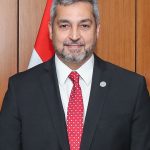Politics
Paraguay Politics
This page explores Paraguay’s political structure incorporating real-time RSS feed news and videos. By harnessing the power of RSS feeds, visitors can stay informed about the latest developments in Paraguay’s politics as they happen. The dynamic nature of these feeds ensures that users receive up-to-the-minute updates on political events, policy changes, and significant milestones, enabling them to stay abreast of the ever-evolving political scene.

Mario Marito Abdo Benítez
51st President of Paraguay
Incumbent
Assumed office
15 August 2018
Image credit
Paraguay is a landlocked country located in the heart of South America. It follows a democratic system of government and operates as a presidential republic. The political structure of Paraguay is defined by its constitution, which was last revised in 1992.
At the top of the political structure is the President, who serves as both the head of state and the head of government. The President is elected by popular vote for a five-year term and can serve only one term consecutively. The President has executive powers and is responsible for leading the government, implementing policies, and representing the country internationally.
The legislative branch consists of the National Congress, which is a bicameral institution. It comprises the Chamber of Deputies and the Senate. The Chamber of Deputies has 80 members elected through proportional representation, while the Senate has 45 members elected on a departmental basis. The National Congress is responsible for making laws, approving the national budget, and overseeing the executive branch.
Paraguay also has an independent judiciary, which is responsible for interpreting and applying laws. The Supreme Court of Justice is the highest judicial authority in the country. It is composed of nine judges who are appointed by the President with the approval of the Senate.
Political parties play a significant role in Paraguay’s political landscape. The two major political parties in the country are the Colorado Party and the Liberal Party. These parties have historically been the dominant forces in Paraguayan politics, and their candidates have regularly competed for the presidency and seats in the National Congress.
It is important to note that Paraguay has faced challenges related to political stability and corruption in the past. However, the country has made efforts to strengthen its democratic institutions and promote transparency and accountability in governance.
Overall, Paraguay’s political structure is characterized by a presidential republic with a separation of powers between the executive, legislative, and judicial branches. The country continues to work towards the consolidation of its democratic system and the improvement of governance.
Unless other sources are listed, original content is provided by ChatGPT. ChatGPT may produce inaccurate information about people, places, or facts. #Paraguay #ParaguayPolitics #ParaguayNews #ParaguayNewsToday #ParaguayRSSFeed #BlahFace



